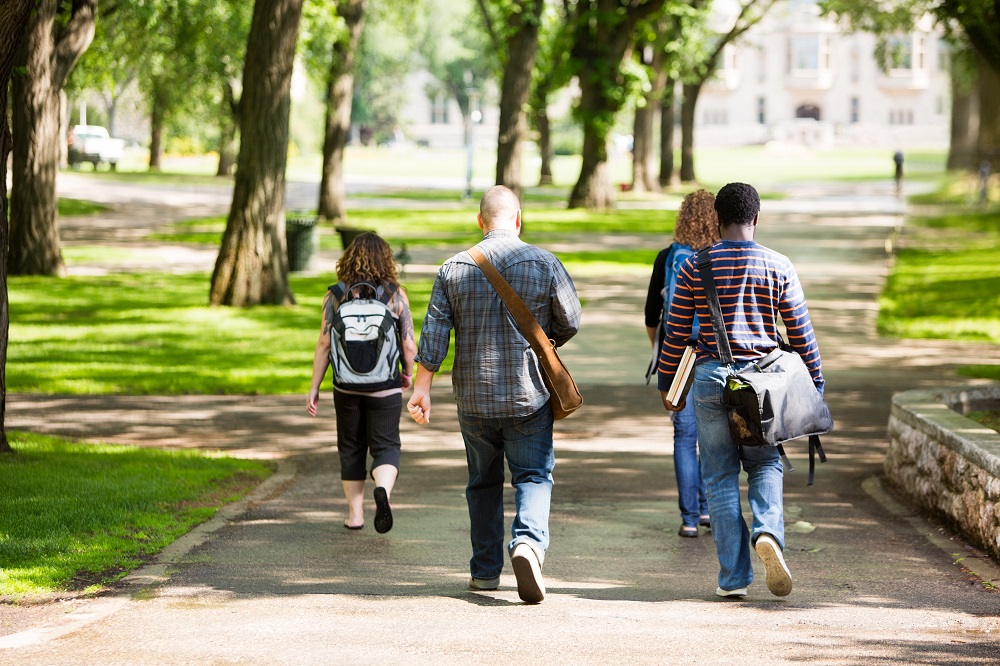What to Look for During a College Visit
It’s that time of year again! High school juniors and seniors are visiting top college choices to explore campus, talk with professors, and meet other prospective students.

College tour guides will show you the newest, most impressive, and most popular parts of campus – but what should you really look for while you’re there?
Where will you spend the majority of your time?
- Classrooms – Your tour will include a classroom or two, but it is very beneficial to find your major’s academic center. Seeing the art classrooms won’t do much good for nursing students! What are your classrooms like? Observe the amenities and setup of each room – is it tech-friendly, lecture focused, or arranged for group discussions?
- Study Centers –Ask yourself, “How will I study most effectively?” and find that place on campus. Is it a quiet room or a busy café? What about meeting rooms for group projects? Some campuses have designated study rooms with built-in technology like interactive boards. Visit the library – it’s always an option too!
- Dorms + Living Arrangements – What kinds of rooms are available to freshmen? Are they doubles, quads, or suite-style? Are the dorms close to your academic buildings, and is there an easy path between them? This will be your home away from home – what will you do to make it comfortable? Additionally, is it required to live on campus your first year? If so, are you allowed to have a car? If not, can you get around the area well enough without one?
What is there to do outside the classroom?
- Jobs + Internships – Does the school offer opportunities to work on campus, or have programs with local employers? Working 10 hours a week at $9 per hour will bring in about $300 per month after taxes – this is a great first step in helping make college more affordable!
- Hangouts –Check out game rooms, coffee shops, and student common areas. Additionally, ask around! There may be great locations off-campus and within walking distance to spend free time.
- Campus Events + Organizations –Does your student ID provide free access to sporting events, performances, and guest speakers? Many universities publish lists of clubs in the Student Services or Admissions office. This list will give details about ways to be involved, meet friends, and make a difference!
How will you stay healthy?
- Dining Hall – One of the most important things you can do to increase brainpower is to eat healthier! The US Centers for Disease Control published a guide that explains the benefits of eating right for students. Does your dining hall offer healthy choices? Do the healthy options taste good?
- Athletic Center – Another way to increase brain function is to be physically active – what will you do for exercise, and how will the athletic facilities and programs support you?
- Health Clinic – Does the university run a clinic you can visit if you have aren’t feeling well? Is there a mental health professional in case you feel homesick, depressed, or stressed? This opportunity is an often-overlooked benefit – don’t let your physical or mental health distract you!
- Place of Worship – Is there a place that will meet your spiritual needs? Don’t neglect this aspect of your health – a recent study from Korean researchers shows that religious and other “nourishing” activities lead to lower stress levels and increased optimism about job prospects (two great things for college students).
Where will you be outstanding?
A big part of college is finding the places you truly shine. Where do you want to make a difference in the world, and how will this college in particular prepare you for that?
Do your best not to get caught up in the emotional highs (or lows) of the campus – the school goes to great lengths to attract you, and you’ll only be there for a few years. Look at the university from the perspective of your future – how will attending this school change you? It may be financial changes, personal growth, technical skills, and social development – but will it be more positive at this school than another?
Choosing the right college doesn’t need to be complicated – visit schools, file the FAFSA, and make a list of pros and cons at each school. If you’d like help exploring options, including colleges, careers, and how to pay for it all, you can contact us!
Schedule your college visits today!
Here are a few offerings from universities around Northeast Indiana:
And some around Northwest Ohio:
